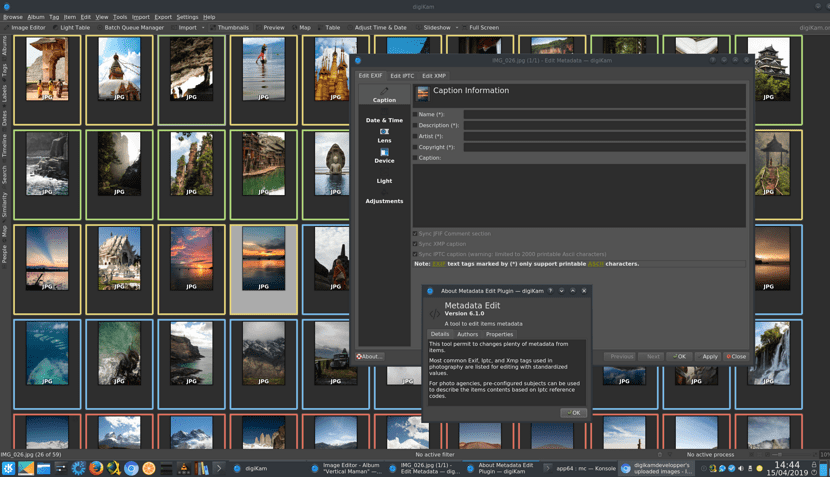
In the past week the new version of digiKam 6.1.0 was released, in which in this new version a new interface was proposed for the development of DPlugins plug-ins, replacing the previously supported KIPI interface and providing more opportunities to extend the functionality of various parts of digiKam, without referencing the digiKam Core API.
For those who are still unaware of this application we can tell you that, digiKam is a free and open source image organizer and tag editor written in C ++ using KDE applications.
Runs on most popular desktop environments and window managers, as long as the necessary libraries are installed.
It supports all major image file formats such as JPEG and PNG, as well as over 200 raw image formats, and you can organize photo collections into directory-based albums or dynamic albums by date, timeline, or tag.
DigiKam 6.1.0 Key New Features
As mentioned at the beginning digiKam 6.1.0 came with a new interface for the development of Dplugins plug-ins that is not limited to landscape mode (Main Album View) and can be used to extend the functionality of Showfoto, Image Editor and Light Table modes, and also features better integration with all major digiKam tools.
In addition to functions such as import / export and metadata editing, API DPlugins can be used to expand palette editing functions, transform, decorate, apply effects, and create handlers for batch work.

Currently, according to the API DPlugins, they have already been prepared 35 Common Plugins, 43 Image Editing Plugins, and 38 Plugins for Batch Queue Manager.
Common Plugins and Image Editing Plugins can be turned on and off on the fly while working with the app (For Batch Queue Manager, dynamic plugin loading is not available yet.)
In the future, it is planned to adapt DPlugins for other parts of digiKam, such as image loading controllers, camera operations, components for working with databases, code for facial recognition, etc.
Other changes
Has been added a new plugin to copy items to local storage, replacing the old tool based on the KIO framework and used to transfer images to external storages.
Unlike the previous tool, the new plugin uses only Qt functions without the involvement of specific KDE frameworks.
Currently, only transfer to local media is supported, but expected that is compatible with access to external repositories via FTP and SSH in the near future, as well as integration with Batch Queue Manager.
Added plugin to set image as desktop background. Currently, wallpaper management is only supported on the KDE Plasma desktop, but support is planned for other Linux desktop environments, as well as macOS and Windows.
The buttons are added to the built-in media player to change the volume and loop through the current playlist.
Added the ability to change font properties for comments displayed in slideshow mode, as well as support for hiding comments by pressing F4.
In mode album thumbnail view (Album Icon-View), support for sorting by file modification time has been added.
Updated AppImage assemblies to accommodate more Linux distributions and upgrade to Qt 5.11.3.
How to install digiKam 6.1.0 on Ubuntu and derivatives?
To install this new version of digiKam 6.1.0 we will download its installer using any of the commands we share with you below
What we are going to do is open a terminal and type the command corresponding to our architecture.
For those who are users of 32-bit systems:
wget https://download.kde.org/stable/digikam/6.1.0/digikam-6.1.0-i386.appimage -O digikam.appimage
If they are users of 64-bit systems:
wget https://download.kde.org/stable/digikam/6.1.0/digikam-6.1.0-x86-64.appimage -O digikam.appimage
We give execution permissions with:
sudo chmod +x digikam.appimage
And they can run the installer by double clicking or from the terminal with:
./digikam.appimage